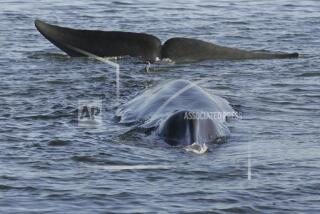Japan to Claim Research Role to Hunt Whales
TOKYO â Officials said today Japan will hunt more than 1,600 whales in the Antarctic for âresearchâ--and allow consumption of their meat--under a loophole in an international ban on commercial whaling, risking retaliation by the United States.
U.S. Embassy officials declined comment on the plan, which Japan submitted March 31 to the International Whaling Commission for review before a June meeting of its scientific committee.
The IWC, the majority of whose members are from non-whaling nations, voted in 1982 to phase out heavily criticized commercial whaling by 1988. Under the ban, Japanâs commercial whaling in the Antarctic ended March 31.
But the commission has said it would consider modifying the ban by 1990 if whale populations were not threatened with extinction. It also allowed research catches in the meantime.
Consumed After Research
âThe Japanese government decided to continue to carry out research activities on whaling during the moratorium,â Kazuo Shima, a Fisheries Agency official, told a news conference. âThe carcasses of the samples will be consumed in Japan after the research.â
Shima acknowledged the move could provoke U.S. retaliation and stiff criticism from other countries and conservation groups.
âIt remains to be seen what the United States will do,â Shima said.
Whale hunting is a centuries-old tradition in Japan, which operated the worldâs largest commercial whaling fleet before the ban. The meat of the seagoing mammal is considered a delicacy.
Shima interpreted the IWC guidelines as allowing Japan to catch more than 1,600 whales in the Antarctic for research over a two-year period and pegged first-year catch quotas at 825 minke whales and 50 sperm whales.
But the minke target catch represents nearly half the 1,941 Japan was allowed commercially in the final year of whaling.
More to Read
Sign up for Essential California
The most important California stories and recommendations in your inbox every morning.
You may occasionally receive promotional content from the Los Angeles Times.










